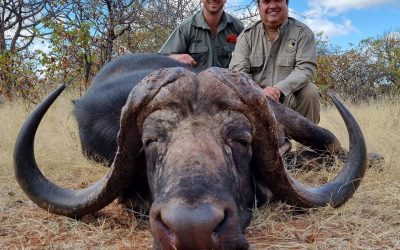So you’re planning a hunting trip to Africa, but before you pack your bags and load your rifle, it’s important to take a step back and consider the ethical implications of your expedition. Africa is home to some of the most majestic and vulnerable wildlife on the planet, and hunting in this continent brings with it a multitude of ethical considerations. From sustainable hunting practices to the preservation of endangered species, this article explores the complex and often debated topic of ethical hunting in Africa.
Preservation of African Wildlife
Conservation efforts
Conservation efforts play a crucial role in the preservation of African wildlife. African countries have made significant strides in establishing protected areas and national parks to maintain the natural habitats of various species. These conservation areas serve as important breeding grounds and safe havens for wildlife. Additionally, organizations such as the World Wildlife Fund (WWF) and the African Wildlife Foundation (AWF) work tirelessly to implement conservation strategies, educate local communities, and monitor the population of endangered species.
Consideration of endangered species
The conservation of endangered species should be of utmost importance in hunting practices. It is essential to identify and prioritize which species are endangered or threatened and take appropriate measures to protect and revive their populations. Strict regulations should be in place to limit or prohibit hunting of species that are critically endangered, ensuring their survival and eventual recovery.
Sustainable hunting practices
Sustainable hunting practices are essential for maintaining a healthy balance between wildlife populations and their habitats. Responsible hunting involves adhering to scientific quotas set by conservationists and wildlife management authorities. These quotas specify the number of animals that can be harvested without jeopardizing the overall population. Sustainable hunting also means targeting mature, post-reproductive animals, which have already contributed to the gene pool and ecosystem dynamics.
Animal Welfare
Humane killing methods
Animal welfare should be a paramount consideration in hunting practices. It is crucial to prioritize humane killing methods to minimize suffering. Hunters must be skilled in using proper equipment and techniques to ensure a swift and clean kill. This can include precision shooting to target vital organs and employing specialized ammunition that delivers an ethical kill. Ethical hunters understand the importance of minimizing pain and suffering for their prey.
Minimizing suffering
In addition to using humane killing methods, ethical hunters strive to minimize suffering throughout the hunting process. This includes taking measures to track and recover wounded animals promptly. Skilled tracking and retrieval techniques are crucial to prevent animals from enduring prolonged agony. Ethical hunters prioritize the welfare of the animals they pursue, ensuring a swift and efficient harvest.
Avoiding trophy hunting
The practice of trophy hunting, where animals are primarily hunted for their trophies such as heads, hides, or body parts, has garnered significant controversy. Ethical considerations urge hunters to refrain from engaging in trophy hunting. Instead, the focus should be on sustainable hunting for food and population control purposes. The notion of hunting solely for personal gratification or collecting trophies opposes the principles of ethical hunting and wildlife conservation.
Economic Impact
Economic benefits for local communities
Ethical hunting practices can have a positive economic impact on local communities. Responsible hunting outfitters and operators often work hand in hand with these communities, providing employment opportunities and income through tourism. Revenue from hunting activities can contribute to local economies, funding community development and supporting vital infrastructure projects.
Funding conservation initiatives
The revenue generated from ethical hunting can also be channeled into funding conservation initiatives. Conservation organizations and government agencies rely on these funds to carry out research, anti-poaching efforts, and habitat restoration projects. By participating in ethical hunting, responsible hunters actively contribute to the preservation and protection of African wildlife and their natural habitats.
Supporting local livelihoods
Ethical hunting practices not only provide economic benefits but also support local livelihoods. By engaging with local guides, trackers, and support staff, hunters create a demand for their services. This, in turn, encourages the development of sustainable tourism enterprises, promoting the growth and stability of local communities.
Legal and Regulatory Framework
Compliance with national and international laws
Ethical hunting requires strict adherence to national and international laws governing wildlife conservation and hunting practices. Hunters must be knowledgeable about the specific regulations in each country they visit and ensure compliance with all relevant laws regarding the hunting of specific species, acquiring permits and licenses, and following ethical guidelines.
Obtaining necessary permits and licenses
Ethical hunting demands obtaining the necessary permits and licenses required by local authorities. These permits ensure that hunting activities are carried out in a controlled and responsible manner. Hunters must go through a rigorous application process, which often includes providing documentation of their hunting experience, passing background checks, and paying fees or royalties.
Enforcement and monitoring
Effective enforcement and monitoring mechanisms are essential to ensure compliance with ethical hunting practices. Local authorities, along with conservation organizations, play a crucial role in monitoring hunting activities, checking permits, and enforcing regulations. This oversight helps maintain transparency and accountability within the hunting industry, reducing the likelihood of illegal or unethical practices.
Cultural Considerations
Respecting indigenous traditions
Respecting indigenous traditions and cultural practices is vital when considering ethical hunting in Africa. Many African communities have long-standing relationships with wildlife and hunting, often deeply rooted in their heritage and identity. Ethical hunters should engage with local communities, respecting their cultural norms and seeking their input on conservation efforts. This includes recognizing the traditional hunting practices of these communities and finding a balance between cultural preservation and sustainable hunting practices.
Involvement of local communities
Involving local communities in conservation initiatives is key to ensuring long-term success. Ethical hunting recognizes the importance of local knowledge and expertise in wildlife management. Engaging with local communities in decision-making processes and empowering them to participate in conservation efforts fosters a sense of ownership and responsibility, leading to more sustainable hunting practices.
Balancing cultural practices with conservation
Ethical hunting seeks to strike a balance between cultural practices and conservation objectives. It is essential to find ways to preserve and celebrate cultural traditions while ensuring that they do not pose a threat to wildlife populations or their habitats. Clear communication, education, and collaboration among hunters, local communities, and conservation organizations are crucial for achieving this delicate balance.
Trophy Hunting
Controversies and debates
Trophy hunting remains a highly controversial topic in the realm of ethical hunting. Advocates argue that legal and well-regulated trophy hunting can generate substantial revenue for conservation and local communities. Critics, on the other hand, question the morality of killing animals solely for their trophies and argue that this practice can have negative implications for population dynamics and species survival.
Sustainability and impact on population
Ensuring the sustainability of trophy hunting is essential for ethical considerations. Highly regulated quota systems and scientific studies help determine which animals can be hunted without endangering populations. Trophy hunting must be based on sound ecological principles and rigorous monitoring to prevent overexploitation and maintain a healthy population balance.
Ensuring fair chase
Fair chase ethics are critical when engaging in trophy hunting. It is important to ensure that animals are not confined or artificially manipulated to enhance hunting opportunities. The principle of fair chase emphasizes the pursuit of free-ranging animals that have a real chance of evading the hunter. This ethical approach emphasizes the importance of an authentic hunting experience that respects the natural instincts and abilities of the targeted species.
Poaching and Illegal Hunting
Environmental and social consequences
Poaching and illegal hunting pose significant threats to African wildlife and ecosystems. The illegal wildlife trade not only results in the unnecessary loss of animal lives but also disrupts ecosystems and negatively impacts local communities. The depletion of wildlife populations can disrupt the delicate balance of ecosystems, leading to cascading effects on other species and ecological processes. Additionally, the social consequences of poaching include increased insecurity, loss of livelihoods, and economic instability.
Efforts to combat poaching
Combatting poaching requires collaborative efforts from law enforcement agencies, conservation organizations, governments, and local communities. Anti-poaching units, equipped with specialized training and resources, work on the ground to protect wildlife from illegal hunting activities. Surveillance technology, community-based wildlife monitoring programs, and international cooperation are all critical in the fight against poaching.
Ethical implications of illegal hunting
Illegal hunting raises significant ethical concerns due to its disregard for conservation laws and sustainable hunting practices. It undermines the efforts of ethical hunters, conservationists, and local communities to protect and preserve African wildlife. Illegal hunting not only threatens the survival of endangered species but also perpetuates corruption, organized crime, and the exploitation of vulnerable communities.
Promotion of Responsible Tourism
Educating tourists about ethical hunting practices
Responsible tourism plays a vital role in promoting ethical hunting practices. Tour operators, travel agencies, and outfitters have a responsibility to educate their clients about ethical hunting standards, conservation efforts, and the importance of sustainable practices. By providing comprehensive information, hunters can make informed decisions and actively contribute to wildlife conservation.
Encouraging responsible behavior
Encouraging responsible behavior among hunters is essential in maintaining ethical hunting standards. This includes respecting hunting quotas, adhering to hunting regulations, and practicing ethical principles such as fair chase, humane killing, and minimizing suffering. Responsible hunters understand the importance of leaving no trace, respecting wildlife habitats, and promoting a positive hunting culture.
Supporting reputable outfitters and operators
Choosing reputable outfitters and operators is crucial for ensuring ethical hunting experiences. Responsible hunters should research and select organizations with a proven track record of sustainable hunting, community engagement, and adherence to conservation principles. Supporting reputable outfitters not only contributes to the local economy but also ensures that hunting activities align with ethical and conservation standards.
Transparency and Accountability
Reporting hunting activities
Transparency and accountability are foundational principles of ethical hunting. It is essential for hunters to report their hunting activities accurately, including the species harvested, locations, and the outcome of each hunt. This information helps authorities and conservation organizations monitor hunting impacts and make informed management decisions.
Monitoring and auditing
Monitoring and auditing hunting activities are crucial in maintaining ethical standards. Independent audits and assessments can evaluate the compliance of hunters, outfitters, and operators with hunting regulations and sustainable practices. This process ensures that ethical hunting is being upheld and provides an opportunity for continuous improvement and responsible management.
Avoiding corruption and unethical practices
Ethical considerations demand the avoidance of corruption and unethical practices within the hunting industry. Transparency in the allocation of hunting permits and licenses, as well as the management of hunting revenue, is crucial to prevent corruption and ensure that funds are directed toward conservation and community development. Upholding high ethical standards is not only essential for wildlife preservation but also for maintaining a positive image of the hunting industry.
Ecological Balance
Maintaining population control
Ethical hunting plays a critical role in maintaining ecological balance by contributing to population control. Through hunting, wildlife management authorities can regulate populations to prevent overpopulation and its associated negative impacts on habitats and other species. By managing population sizes, ethical hunting helps optimize ecological health and species diversity.
Mitigating ecological impact
Ethical hunting practices consider and mitigate the ecological impact of hunting activities. Close collaboration with conservationists and wildlife management experts enables hunters to identify appropriate hunting areas and seasons, aiming to minimize disturbance to sensitive ecosystems or breeding activities. Efforts to reduce the ecological footprint of hunting include responsible waste management, respecting buffer zones, and providing financial resources for habitat restoration.
Consideration of carrying capacity
Understanding and respecting carrying capacity is crucial in ethical hunting. Carrying capacity refers to the maximum population size that an ecosystem can sustainably support. Ethical hunters consider the carrying capacity of hunting grounds when setting quotas and determining the number of animals that can be harvested. This ensures that hunting activities do not exceed the ecosystem’s capacity to regenerate and maintain healthy populations.











